TRAI [BLAZER
Page 54
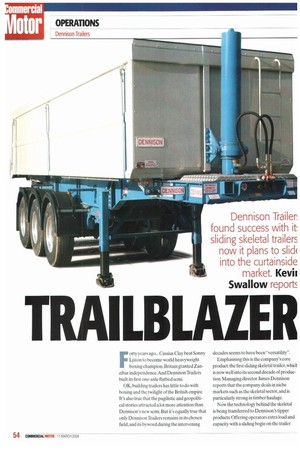
Page 55
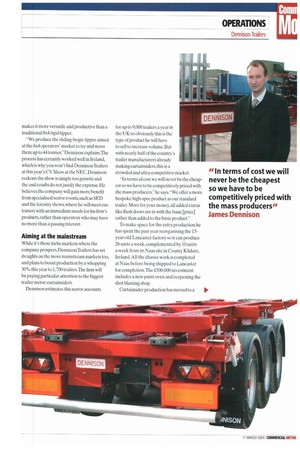
Page 56
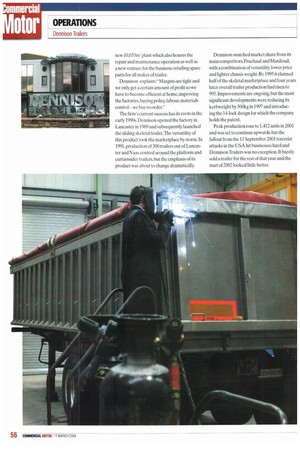
Page 57
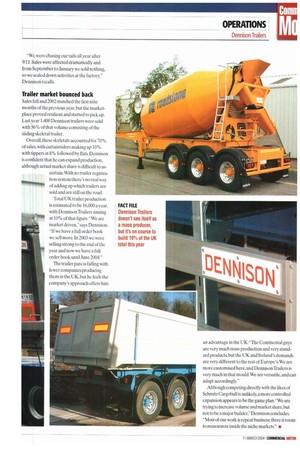
Page 58
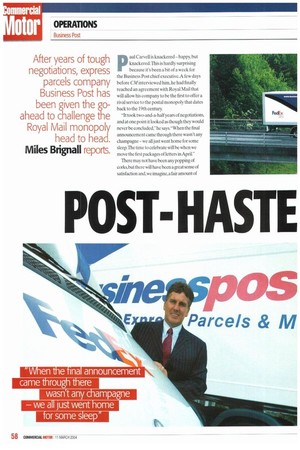
If you've noticed an error in this article please click here to report it so we can fix it.
Forty years ago... Cassius Clay beat Sonny Liston to become world heavyweight boxing champion. Britain granted Zanzibar independence. And Dennison Trailers built its first one-axle flatbed semi.
OK, building trailers has little to do with boxing and the twilight of the British empire. It's also true that the pugilistic and geopolitical stories attracted a lot more attention than Dennison's new semi. But it's equally true that only Dennison Trailers remains in its chosen field,and its byword during the intervening decades seems to have been "versatility".
Emphasising this is the company's core product: the first sliding skeletal trailer, which is now well into its second decade of production. Managing director James Dennison reports that the company deals in niche markets such as the skeletal sector, and is particularly strong in timber haulage.
Now the technology behind the skeletal is being transferred to Dennison's tipper products. Offering operators extra load and capacity with a sliding bogie on the trailer makes it more versatile and productive than a traditional 8x4 rigid tipper.
"We produce the sliding-bogie tipper aimed at the 8x4 operators' market to try and move them up to 44 tonnes." Dennison explains.The process has certainly worked well in Ireland, which is why you won't find Dennison Trailers at this year's CV Show at the NEC. Dennison reckons the show is simply too generic and the end results do not justify the expense. He believes the company will gain more benefit from specialised sector events, such as SED and the forestry shows, where he will meet customers with an immediate needs for his firm's products, rather than operators who may have no more than a passing interest.
Aiming at the mainstream
While it's these niche markets where the company prospers. DennisonTrailers has set its sights on the more mainstream markets too, and plans to boost production by a whopping 30% this year to 1,700 trailers.The firm will be paying particular attention to the biggest trailer sector: curtainsiders.
Dennison estimates this sector accounts for up to 9,000 trailers a year in the UK so obviously this is the type of product he will have to sell to increase volume. But with nearly half of the country's trailer manufacturers already making curtainsiders, this is a crowded and ultra-competitive market.
"In terms of cost we will never be the cheapest so we have to be competitively priced with the mass producers.he says "We offer a more bespoke high-spec product as our standard trailer. More for your money, all added extras like flush doors are in with the basic [price] rather than added to the basic product."
To make space for the extra production he has spent the past year reorganising the 15year-old Lancaster factory so it can produce 26 units a week, complemented by 10 units a week from its Naas site in County Kildare, Ireland. All the chassis work is completed at Naas before being shipped to Lancaster for completion.The £500,000 investment includes a new paint oven and reopening the shot blasting shop.
Curtainsider production has moved to a new 10,033m2 plant which also houses the repair and maintenance operation as well as a new venture for the business: retailing spare parts for all makes of trailer.
Dennison explains:"Margins are tight and we only get a certain amount of profit so we have to become efficient at home,improving the factories, buying policy, labour, materials control — we buy to order."
The firm's current success has its roots in the early 1990s. Dennison opened the factory in Lancaster in 1989 and subsequently launched the sliding skeletal trailer.The versatility of this product took the marketplace by storm. In 1991, production of 300 trailers out of Lancaster and Naas centred around the platform and curtainsider trailers, but the emphasis of its product was about to change dramatically. Dennison snatched market share from its main competitors, Fruehauf and Maxiload, with a combination of versatility,lower price and lighter chassis weight. By 1995 it claimed half of the skeletal marketplace and four years later overall trailer production had risen to 995. Improvements are ongoing, but the most significant developments were reducing its kerbweight by 500kg in 1997 and introducing the 14-lock design for which the company holds the patent.
Peak production rose to 1,412 units in 2001 and was set to continue upwards, but the fallout from the 11 September 2001 terrorist attacks in the USA hit businesses hard and Dennison Trailers was no exception. It barely sold a trailer for the rest of that year and the start of 2002 looked little better. "We were chasing our tails all year after 9/11. Sales were affected dramatically and from September to January we sold nothing. so we scaled down activities at the factory." Dennison recalls.
Trailer market bounced back
Sales fell and 2002 matched the first nine months of the previous year. but the marketplace proved resilient and started to pick up. Last year 1.400 Dennison trailers were sold with 56% of that volume consisting of the sliding skeletal trailer.
Overall, these skeletals accounted for 70% of sales, with curtainsiders making up 10% with tippers at 8% followed by flats. Dennison is confident that he can expand production, although actual market share is difficult to ascertain. With no trailer registration system there's no real way of adding up which trailers are sold and are still on the road.
Total UK trailer production is estimated to be 16,000 a year. with Dennison Trailers aiming at 10% of that figure."We are market driven," says Dennison. "If we have a full order book we sell more. In 2003 we were selling strong to the end of the year and now we have a full order book until June 2004."
The trailer pare is falling with fewer companies producing them in the UK, but he feels the company's approach offers him an advantage in the UK: "The Continental guys are very much mass production and very standard products, but the UK and Ireland's demands are very different to the rest of Europe's.We are more customised here, and Dennison Trailers is very much in that mould. We are versatile, and can adapt accordingly" Although competing directly with the likes of Sclunitz Cargobull is unlikely, a more controlled expansion appears to be the game plan."We are trying to increase volume and market share.but not to be a major builder," Dennison concludes "Most of our work is repeat business; there is room to manoeuvre inside the niche markets" • paul Carvell is knackered — happy, but knackered.This is hardly surprising because its been a bit of a week for the Business Post chief executive. A few days before CM interviewed him, he had finally reached an agreement with Royal Mail that will allow his company to be the first to offer a rival service to the postal monopoly that dates back to the 19th century.
"It took two-and-a-half years of negotiations, and at one point it looked as though they would never be concluded," he says. "When the final announcement came through there wasn't any champagne — we all just went home for some sleep. The time to celebrate will be when we move the first packages of letters in April."
There may not have been any popping of corks,but there will have been a great sense of satisfaction and,we imagine,a fair amount of
































































































































































































